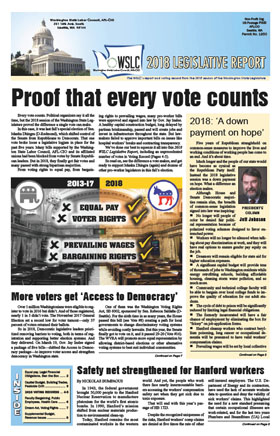STATE GOVERNMENT
2018 legislative session was ‘a down payment on hope’
 The following story appears in the Washington State Labor Council’s 2018 Legislative Report (HTML or PDF) published in May.
The following story appears in the Washington State Labor Council’s 2018 Legislative Report (HTML or PDF) published in May.
PRESIDENT’S COLUMN
By JEFF JOHNSON
Five years of Republican stranglehold on common-sense measures to improve the lives and working conditions of working people has come to an end. And it’s about time.
Much longer and the people of our state would have become as cynical as the Republican Party itself. Instead the 2018 legislative session was a down payment on hope. What a difference an election makes.
Although House and Senate Democratic majorities remain slim, the breadth of common-sense legislation signed into law was inspiring:
● No longer will people of color be denied fair political representation because of polarized voting schemes designed to favor entrenched power.
● Workers will no longer be silenced when talking about pay discrimination at work, and they will have real options to ensure gender pay equity on the job.
● Dreamers will remain eligible for state aid for higher education expenses.
● A significant capital budget will provide tens of thousands of jobs to Washington residents while energy retrofitting schools, building affordable housing, cleaning storm water pollution, and so much more.
● Community and technical college faculty will be able to bargain over local college funds to improve the quality of education for our adult students.
● The cycle of debt to prison will be significantly reduced by limiting legal financial obligations.
● The formerly incarcerated will have a fair chance of employment by eliminating the box for “felony” on job application forms.
● Hanford cleanup workers who contract beryllium poisoning, lung cancer or occupational dementia will be presumed to have valid workers’ compensation claims.
● Prevailing wages will be set by local collective bargaining rates.
● Automatic voter registration upon license renewal and same-day voter registration will increase the voice of democracy in Washington.
Many of those bills waited for five years to see the light of day. Let’s keep the sun shining by supporting candidates who support working people.
The Legislature was not able to address the structural deficit that Washington state has suffered for more than a decade. We simply do not raise enough revenue to adequately pay for the needs of our society. This became painfully clear in the “Great Recession” of 2008 and every year since.
Republicans of today are stuck in the dead-end narrative that taxes and government spending are bad. They should remember the words of the first Republican, Abraham Lincoln: “The legitimate object of Government is to do for the people what needs to be done but for which they cannot by individual effort do at all, or do so well, by themselves.”
President Franklin D. Roosevelt quoted this from Lincoln in a 1936 speech and added his own statement that “taxes are the price we all pay collectively to get things done.”
FDR believed in the doctrine of democracy in taxation — that taxes ought to be higher for those who can afford to pay them and less for those who can afford to pay less. If, as Supreme Court Justice Oliver Wendell Holmes said, “Taxes are the price we pay for civilized society,” and if we want a fair society then, according to FDR, taxes shall be levied according to ability to pay.”
This is an important principle for Democrats going into the 2019 session. We need to raise enough revenue to pay for a civilized society while lessening the burden on those who have less and taxing the wealthy fairly. The wealthy in Washington state don’t come close to paying their fair share.
But some will argue, if we tax the rich more, they will leave our state. As FDR responded when this argument was made to him, “(we) shall miss them very much.” The point is the wealthy in our state can and should pay a percentage of their income in taxes significantly greater than those in the bottom income quintile, but they don’t. And if they did, surely they would not have to dress in rags, forgo a latte, or send their children to public schools.
As climate destruction exacts greater costs to our environment, economy, health and property, more and more public revenue will have to be diverted from education, health care, mental health, state parks, etc. Climate change significantly raises the price of civilized society.
To counter this, we need to both fairly tax the wealthy and put a price on carbon emissions.
Gov. Jay Inslee and Sens. Reuven Carlyle, Guy Palumbo and Kevin Ranker, with support from Rep. Joe Fitzgibbon, made a valiant effort to pass a carbon tax during the 2018 session. Unfortunately, the resistance from the fossil fuel industry remained too great and Democratic majorities too slim to pass the bill out of the Senate.
In light of the legislative failure, The Alliance for Jobs and Clean Energy, a coalition of labor, organizations of color and environmental groups, working closely with the tribes, has filed Initiative 1631. It would set a carbon fee on large emitters and use that revenue to create equity for low-income individuals, communities and displaced workers. It would leverage investments in the clean-energy economy and creating healthier air, forests and water. If I-1631 qualifies for the ballot and passes, it will significantly lower carbon emissions, and facilitate the transition to a clean-energy economy, while not leaving communities and individuals behind.
 Jeff Johnson is President of the Washington State Labor Council, AFL-CIO, the largest labor organization in the Evergreen State, representing the interests of more than 600 local unions and approximately 450,000 rank-and-file union members.
Jeff Johnson is President of the Washington State Labor Council, AFL-CIO, the largest labor organization in the Evergreen State, representing the interests of more than 600 local unions and approximately 450,000 rank-and-file union members.
Click here to see more reports from the Washington State Labor Council’s 2018 Legislative Report. Or download the entire 8-page PDF.





